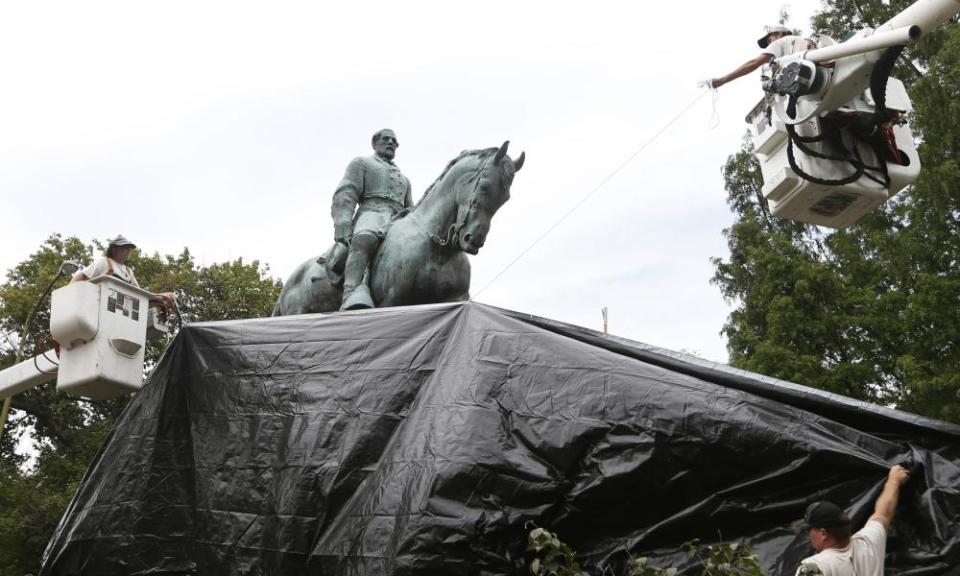'Neo-Nazi cowards': white nationalists stage brief Charlottesville rally
Richard Spencer leads ‘flash mob’ by covered statue of Robert E Lee
Mayor slams event in town where counter-protester Heather Heyer was killed

Marchers led by the white supremacist Richard Spencer staged a “flash mob” by torchlight on Saturday in Charlottesville, Virginia, where a rally in August led to the death of Heather Heyer, a peaceful counter-protester who was run down by a car.
A local television station reported that a few dozen white nationalists began their new protest at 7.45pm and left just 15 minutes later.
Spencer told the Washington Post: “It was a planned flash mob. It was a great success. We’ve been planning this for a long time. We wanted to prove that we came in peace in May, we came in peace in August, and we come again in peace.”
Spencer staged a similar pop-up torchlit rally in May, a brief stunt that sparked a series of increasingly large and sometimes violent white supremacist rallies.
On Saturday, the protesters gathered at Emancipation Park near a statue of the Confederate general Robert E Lee. Spencer posted a video on Twitter showing the protest, in which opponents of the removal of the statue chanted “You will not replace us” and “We will be back”.
The Post reported that the crowd also chanted: “The south will rise again. Russia is our friend. The south will rise again. Woo-hoo! Wooo.”
Using Twitter, Charlottesville’s mayor, Mike Signer, told Spencer and the marchers to “go home”. “Another despicable visit by neo-Nazi cowards,” he wrote, adding: “You’re not welcome here! We’re looking at all our legal options. Stay tuned.“
The statue of Lee was covered in an official gesture of mourning for Heyer, but its removal has been blocked by a court pending the outcome of a legal challenge.
The August rally to protest against the removal of the statue turned deadly when a car was driven deliberately into a crowd of peaceful counter-protesters, killing Heyer, a 32-year-old civil rights activist who worked as a legal assistant at a Virginia firm. Its driver, 20-year-old James Shields, was charged with murder.
Heated national debate continues over whether Confederate symbols of the civil war, including statues and the Confederate battle flag memorialise leaders and soldiers, or evoke white supremacy and the enslavement of African American people.
In the wake of the August rally in Charlottesville – as after a white supremacist shot dead nine African Americans in a church in Charleston, South Carolina in June 2015 – cities have acted to remove memorials to Confederate generals, politicians and soldiers.
Donald Trump’s reaction to the August rally caused controversy. The president, who then still retained “alt-right” figurehead Steve Bannon as a White House adviser, repeatedly blamed “both sides” and “many sides” for the violence around Heyer’s death and said there were “very fine people” who marched alongside the neo-Nazis. He has since repeated such equivocation.
On Saturday night, a local NBC station’s description of the Charlottesville marchers as “white activists” caused controversy. Many respondents on social media said they should be referred to simply as white supremacists or neo-Nazis.
Earlier this month Heyer’s mother, Susan Bro, told the Guardian she was proud of her daughter’s actions.
“I think it’s a damn shame that a white girl had to die for people to have to pay attention,” Bro said. “I think if a black girl had died, or a black man, [the reaction would have been] ‘Oh well, another person lost to violent protest.’”
Speaking to the Guardian in early September, some black Charlottesville residents said they hoped the town would no longer dignify the Nazis with counter-protests.
A black fourth-year student at the University of Virginia, who did not want to give her name, said many young students of color had been so disturbed and upset by the neo-Nazi protests that they had considered transferring to a different college.
On Saturday, Charlottesville police said in a statement that officers had followed a bus carrying Spencer and his followers, “to ensure that the group was leaving the city”.
“Our department is conferring with city leadership and the Commonwealth Attorney’s office to determine what legal action may be taken in response to this event,” the statement said.

